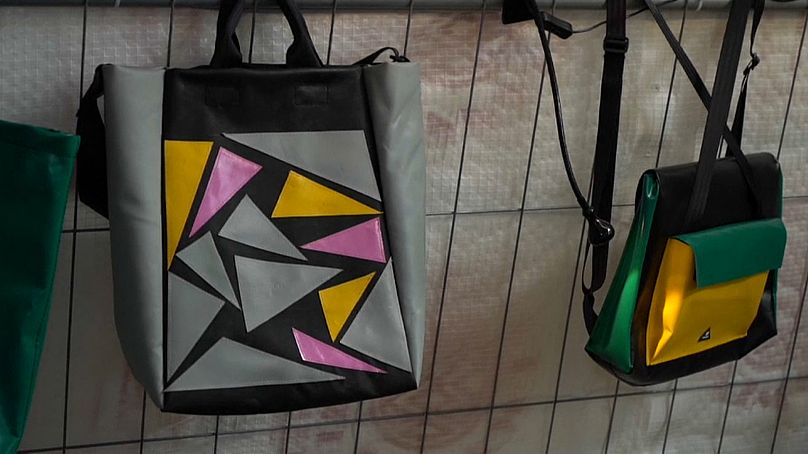German friends launch a sustainable fashion label that produces trendy handbags out of used dinghies.
Two friends who cleared beaches at the height of the migrant crisis in Europe have launched a fashion label, which sells bags made from rubber dinghies.
 ADVERTISEMENT
ADVERTISEMENT
 ADVERTISEMENT
ADVERTISEMENT
Europe saw its biggest influx of migrants in 2015 — when over one million people from Africa, Asia and the Middle East — made the perilous journey across the Mediterranean to the continent.
Upon reaching European shores, the migrants would abandon their rubber dinghies and flee, leaving a trail of food wrappers, drink cartons, and blankets in their passing.
University friends Vera Gunther and Nora Azzaoui took extended leave from their jobs in Berlin to volunteer and help with the cleanup on the Greek island of Chios.
But with the dinghies proving bulky and difficult to throw away, the pair wondered if they could reuse them, so they sent a piece of material from a boat to a fashion designer friend.
The prototype came back in the form of a trendy handbag.
"This is a symbol," explained Gunther. “This material that was understood as waste has a story of courage and hope. To turn this into something new, by doing that [we show] that even within difficult situations we can find something positive.”
Eyeing an opportunity, the pair founded sustainable fashion label mimycri, which with the aid of €40,000 from government grant money and crowdfunding, they were able to rent warehouse space and reproduce the bags in large quantities.
They also hired two migrant tailors to help: Khaldoon, a refugee from Syria, and Abid Ali from Pakistan.
Ali recalled his voyage to Greek island Kos from Turkey: "I was steering the dinghy that night. It was nearly a two-hour long journey.
"It was a very difficult journey, fraught with danger because the dinghy was small and overloaded with passengers. It could only hold 27 people and there were 47 people on it, including seven children.
"Whenever I see a dinghy brought in, with lots of dirt and mud on it, that scene takes me back to that journey I made, I get a flashback."
“But then I start feeling good about how mimycri has helped me, they gave me work here, I tailor these dinghies into bags. I do feel good about that, but I'm constantly reminded of the past — when that happens, sometimes I get really sad."
But mimicry has given Khaldoon and Ali renewed purpose.
"The people who arrive at the shores of Europe are just people like me and you, are people with talents, they had jobs in their home countries, so we wanted to do something that shows this," said Gunther.











